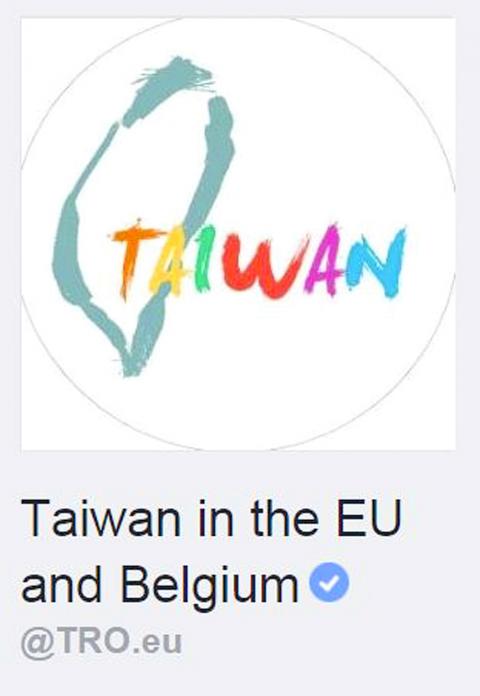Several of the nation’s embassies and representative offices have updated their Facebook pages, adding “Taiwan” to their names and profile pictures to promote the nation.
The name change was advised by the Ministry of Foreign Affairs.
The Taipei Economic and Cultural Office in Seattle changed the name of its Facebook page to “Taiwan in Seattle” and uploaded a new profile picture featuring an illustration of Taiwan proper with the word “Taiwan” on it.

Image copied from the Facebook timeline of the Taiwan Representative Office in the EU and Belgium
Representative offices that have changed their Facebook names include those in San Francisco, Boston, Chicago, Atlanta, Sao Paulo, Vancouver, Peru, Chile, Latvia, the Czech Republic, Ireland, Indonesia and Naha, Japan.
The nation’s representative offices in Denver, Brussels, Geneva and Palau also changed their names and uploaded the same profile picture.
Those that have announced a name change, but have yet to do so include the Taipei Economic and Cultural Office in Los Angeles and the Taipei Representative Office in the Netherlands.
Since opening a Facebook account in July last year, the ministry has encouraged embassies and representative offices to set up Facebook accounts, said Henry Chen (陳銘政), head of the Department of International Information Services.
Of the more than 100 embassies and representative offices, 54 have a Facebook page, he added.
The pages previously adopted different nomenclatures and profile pictures, which in some cases made it difficult to tell whether the offices represented Taiwan, Chen said.
As a result, the ministry last month advised them to use the same name format and profile picture, he said, adding that the name “Taiwan” is more direct and clear than “Taipei office.”
The Department of International Information Services offered the advise, but did not require the offices to adopt them, he added.
Asked whether the name change was suggested with any political intentions in mind, especially after a referendum to rename the national sports team was rejected on Nov. 24, Chen said that was not the case.
The goal was simply to ensure that the offices have a consistent image and to allow visitors to immediately know that they represent Taiwan.
The ministry decided to promote the name change on Facebook first, because it is the main social media platform used by Taiwanese embassies and representative offices, he said, adding that only some of them are on Twitter.
The Facebook pages of the nation’s embassies and representative offices have more than 100,000 followers and are viewed more than 1 million times every month, Chen said.

CHAOS: Iranians took to the streets playing celebratory music after reports of Khamenei’s death on Saturday, while mourners also gathered in Tehran yesterday Iranian Supreme Leader Ayatollah Ali Khamenei was killed in a major attack on Iran launched by Israel and the US, throwing the future of the Islamic republic into doubt and raising the risk of regional instability. Iranian state television and the state-run IRNA news agency announced the 86-year-old’s death early yesterday. US President Donald Trump said it gave Iranians their “greatest chance” to “take back” their country. The announcements came after a joint US and Israeli aerial bombardment that targeted Iranian military and governmental sites. Trump said the “heavy and pinpoint bombing” would continue through the week or as long

TRUST: The KMT said it respected the US’ timing and considerations, and hoped it would continue to honor its commitments to helping Taiwan bolster its defenses and deterrence US President Donald Trump is delaying a multibillion-dollar arms sale to Taiwan to ensure his visit to Beijing is successful, a New York Times report said. The weapons sales package has stalled in the US Department of State, the report said, citing US officials it did not identify. The White House has told agencies not to push forward ahead of Trump’s meeting with Chinese President Xi Jinping (習近平), it said. The two last month held a phone call to discuss trade and geopolitical flashpoints ahead of the summit. Xi raised the Taiwan issue and urged the US to handle arms sales to

State-run CPC Corp, Taiwan (CPC, 台灣中油) yesterday said that it had confirmed on Saturday night with its liquefied natural gas (LNG) and crude oil suppliers that shipments are proceeding as scheduled and that domestic supplies remain unaffected. The CPC yesterday announced the gasoline and diesel prices will rise by NT$0.2 and NT$0.4 per liter, respectively, starting Monday, citing Middle East tensions and blizzards in the eastern United States. CPC also iterated it has been reducing the proportion of crude oil imports from the Middle East and diversifying its supply sources in the past few years in response to geopolitical risks, expanding

An Emirates flight from Dubai arrived at Taiwan Taoyuan International Airport yesterday afternoon, the first service of the airline since the US and Israel launched strikes against Iran on Saturday. Flight EK366 took off from the United Arab Emirates (UAE) at 3:51am yesterday and landed at 4:02pm before taxiing to the airport’s D6 gate at Terminal 2 at 4:08pm, data from the airport and FlightAware, a global flight tracking site, showed. Of the 501 passengers on the flight, 275 were Taiwanese, including 96 group tour travelers, the data showed. Tourism Administration Deputy Director-General Huang He-ting (黃荷婷) greeted Taiwanese passengers at the airport and